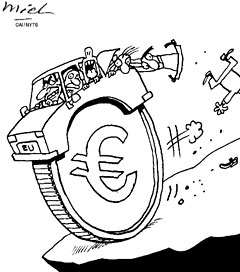One thing that apparently comes as a surprise to many people who love to intone about what history tells us about the dangers of debt is the fact that Britain has had remarkably high public debt relative to gross domestic product for most of its modern history.
But here’s a question: How relevant are these historical debt levels to current concerns?
Leave aside the notion that the discipline of capital markets is somehow a new thing. The point that occurred to me is that since the real burden of debt is the possible distortionary effect of the taxes that must be levied to service that debt, it probably matters that both taxation and spending were very different in the 19th century, or even in the interwar period, than they are now.
These differences cut both ways.
On one side, government was much smaller in bygone days, and the level of taxation required to pay for things other than debt service was correspondingly low. Now, the distortionary effects of taxation, at least according to standard Economics 101, are nonlinear: going from 40 to 45 percent creates a much bigger deadweight loss than going from 10 to 15. So this would seem to suggest that with other things equal, the small governments of the 19th century should have been more able than the big governments of today to handle high levels of debt.
But other things aren’t equal. Modern governments have a much broader tax base than governments of yore; instead of relying on tariffs and maybe land taxes, they have income taxes, payroll taxes and value-added taxes. This allows the Nordic countries, for example, to finance very generous welfare states with remarkable ease. So the improved technology of tax collection arguably offsets the fact that we start from higher levels of taxes, and may well make it possible for us to handle higher levels of debt than our great-great-grandfathers.
In the specific case of the United States, the obvious point is that we start from much lower taxation than many other advanced countries, so we really shouldn’t be worried about the slightly higher share of G.D.P. that we will have to collect to service the debt run up during the crisis.
But the general point is that one needs to be careful when using historical debt levels; they remain highly suggestive, and I for one won’t stop citing them, but this era is different, in at least two ways.
European Fiscal History
Vox, the economic policy Web site, has a nice paper decomposing the rise in debt-G.D.P. ratios for troubled European economies.
I’d make special note of this observation: “Projections suggest that some European countries had an unsound fiscal stance (in terms of debt-to-G.D.P. ratio evolution) well before the 2008-9 financial crisis (Greece, Portugal, the U.K.); on the contrary, others had a sound fiscal stance (Spain, Ireland, Italy),” according to the recent analysis by Gianluca Cafiso, a research fellow of the University of Catania in Italy.
To understand what this means, you need to know that the combined G.D.P. of Greece and Portugal is a bit over $500 billion (Britain isn’t in crisis), while the combined G.D.P. of Spain, Ireland and Italy is more than $3.5 trillion. So the economies now in trouble were, overwhelmingly as measured by economic importance, following sound fiscal policies before the crisis. Yet the whole European response has been based on the assumption that fiscal profligacy was the villain.
Truthout has licensed this content. It may not be reproduced by any other source and is not covered by our Creative Commons license.
Paul Krugman joined The New York Times in 1999 as a columnist on the Op-Ed page and continues as a professor of economics and international affairs at Princeton University. He was awarded the Nobel in economic science in 2008.
Mr Krugman is the author or editor of 20 books and more than 200 papers in professional journals and edited volumes, including “The Return of Depression Economics” (2008) and “The Conscience of a Liberal” (2007).
Copyright 2011 The New York Times.
UNTIL MIDNIGHT: All gifts to Truthout now matched!
Today all donations to Truthout will be matched dollar for dollar! Thanks to a generous supporter, your one-time gift today will be matched immediately. As well, your monthly donation will be matched for the whole first year, doubling your impact.
We have just one day left to reach our goals: raising $35,000 in one-time gifts and adding 450 new monthly donors.
This matching gift comes at a critical time. Trump has made it no secret that he is planning a demolition-style attack on both specific communities and democracy as a whole, beginning on his first day in office.
Help us prepare for Trump’s Day One, and have your donation matched today!
